Saudi vessel helps thwart hijack of Turkish ship off Gulf of Aden
Güncelleme Tarihi:

A Saudi navy frigate on Monday provided protection for a Turkish cargo ship after receiving a distress call from the ship early this morning as three small boats attempted to hijack it in the international waters near the Gulf of Aden, state news agency SPA reported. (UPDATED)
The pirates fled the area following the arrival of the frigate, Al-Riyadh, which then escorted the Turkish merchant ship Yasa Seyhan out of the danger zone, the agency said on its website.�
Piracy is rife and well organized in the area where
The heavily armed pirates operate high-powered speedboats and sometimes hold ships for weeks before releasing them for large ransoms paid by governments or shipowners.
Three Turkish vessels were hijacked in the
A Turkish frigate will join an international coalition against Somali pirates in the
Photo is an archive image.

